
Revista Fitotecnia Mexicana
Scope & Guideline
Advancing Agricultural Knowledge for a Sustainable Future
Introduction
Aims and Scopes
- Crop Genetics and Breeding:
Research on genetic diversity, the development of new cultivars, and breeding techniques aimed at improving crop resilience, yield, and quality, particularly in staple crops like maize, wheat, and beans. - Sustainable Agriculture Practices:
Studies focusing on sustainable farming methods, including organic farming, biostimulants, and the use of biofertilizers that enhance soil health and crop productivity while minimizing environmental impact. - Plant Physiology and Biochemistry:
Investigations into the physiological responses of plants to various stress factors, nutrient availability, and environmental conditions, providing insights into optimizing plant growth and crop yield. - Agroecology and Ecosystem Services:
Research addressing the interactions between agricultural practices and ecosystem services, emphasizing biodiversity, soil health, and the socio-economic aspects of agriculture. - Food Technology and Nutritional Quality:
Studies that examine the quality, safety, and nutritional properties of agricultural products, including post-harvest processing and value-added products.
Trending and Emerging
- Climate Resilience and Adaptation Strategies:
A notable increase in research focused on adapting agricultural practices to climate change, including the resilience of crops to extreme weather conditions and the development of climate-smart agricultural systems. - Use of Biostimulants and Organic Fertilizers:
Growing interest in the application of biostimulants and organic fertilizers to enhance crop growth and soil health, reflecting a shift towards more sustainable agricultural practices. - Technological Innovations in Agriculture:
Emerging themes in the application of technology, such as machine learning and precision agriculture, to improve crop management and resource efficiency. - Nutritional and Functional Food Research:
An increasing focus on the nutritional value and health benefits of crops, particularly in the context of food security and public health, emphasizing the role of diverse diets. - Diversity and Conservation of Native Species:
Research on the characterization and conservation of native plant species and their genetic diversity, reflecting a recognition of the importance of local biodiversity for sustainable agriculture.
Declining or Waning
- Traditional Pest Management:
Research on conventional chemical pest control methods appears to be less frequent, possibly due to a growing emphasis on integrated pest management (IPM) and organic farming practices. - Drought Resistance Studies in Non-Local Crops:
There seems to be a decreasing trend in studies focusing on drought resistance in crops not native to Mexico, as researchers pivot towards local species and varieties that can better adapt to regional climatic conditions. - Conventional Soil Fertility Management:
The frequency of papers addressing traditional soil fertility practices has diminished, likely reflecting a broader interest in sustainable soil management practices that incorporate organic amendments and biostimulants.
Similar Journals
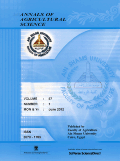
ANNALS OF AGRICULTURAL SCIENCES
Transforming Agricultural Science into Practical SolutionsANNALS OF AGRICULTURAL SCIENCES, published by Elsevier, stands as a leading open access journal dedicated to the multifaceted field of agricultural sciences. Since its inception in 2011, this journal has served as a pivotal platform for the dissemination of high-quality research, covering areas such as agronomy, animal science, horticulture, food science, plant science, and soil science. With an impressive Q1 ranking across multiple disciplines and notable positions in Scopus Ranks—including #6 in Animal Science and Zoology and #3 in Horticulture—this journal is recognized globally for its significant contribution to advancing agricultural innovations. The journal caters to a diverse audience of researchers, professionals, and students, providing them with open access to cutting-edge studies that address critical issues in agricultural productivity and sustainability. Its commitment to high-impact research ensures that articles contribute meaningfully to the scientific community, fostering advancements in agricultural practices and policies.

JOURNAL OF HORTICULTURAL SCIENCE & BIOTECHNOLOGY
Cultivating knowledge at the intersection of science and biotechnology.JOURNAL OF HORTICULTURAL SCIENCE & BIOTECHNOLOGY, published by Taylor & Francis Ltd, stands as a prestigious platform in the realms of both horticulture and biotechnology. With an ISSN of 1462-0316 and an E-ISSN of 2380-4084, this journal showcases cutting-edge research that advances our understanding of plant science and genetic innovation. Operating under the publication umbrella from 1996 to 2024, the journal has achieved notable rankings, placing in the Q3 quartile for Genetics and Q2 for Horticulture in 2023. With a Scopus ranking of #25/115 in Agricultural and Biological Sciences (Horticulture) and a respectable 78th percentile, it is highly regarded among researchers and professionals alike. While currently not designated as Open Access, the journal remains crucial for academics keen on disseminating groundbreaking findings and techniques that foster advancements in agricultural productivity and sustainability. As an essential resource for researchers, professionals, and students, JOURNAL OF HORTICULTURAL SCIENCE & BIOTECHNOLOGY not only facilitates knowledge sharing within its community but also serves as a vital reference point for future innovations in the field.
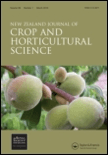
NEW ZEALAND JOURNAL OF CROP AND HORTICULTURAL SCIENCE
Cultivating Knowledge in Crop and Horticultural ScienceThe New Zealand Journal of Crop and Horticultural Science, published by Taylor & Francis Ltd, stands as a key resource in the fields of Agronomy and Horticulture, with a commendable impact factor reflecting its quality and influence in the scientific community. Since its inception in 1989, this journal has been committed to advancing our understanding of crop development and horticultural practices, catering not only to researchers and professionals but also to students eager to delve into the intricacies of plant sciences. With a Q3 ranking in both Agronomy and Crop Science and Horticulture as of 2023, the journal occupies a significant position within the agricultural and biological sciences domain, significantly contributing to the body of knowledge in these fields. The journal features original research, reviews, and technical notes that cover a wide range of topics, ensuring a comprehensive perspective on contemporary and emerging agricultural issues. For individuals interested in accessing cutting-edge research, the journal provides subscription-based access, further enhancing its scholarly contributions.
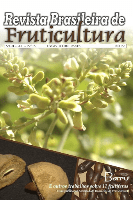
Revista Brasileira de Fruticultura
Innovating Horticulture for a Sustainable FutureRevista Brasileira de Fruticultura, published by the Sociedade Brasileira de Fruticultura, is a leading scholarly journal dedicated to the advancement of research in the fields of agronomy, crop science, food science, horticulture, and plant science. With an impressive Open Access model adopted since 2001, the journal is committed to disseminating high-quality research from Brazil and beyond, promoting innovation and collaboration among researchers, professionals, and students alike. The journal currently holds a respectable Q3 category ranking in multiple fields as of 2023, reflecting its significance within the scientific community, specifically ranked #72 in horticulture and #257 in agronomy, among its peers. The Revista Brasileira de Fruticultura not only serves as a platform for original research articles, reviews, and case studies but also emphasizes practical applications and sustainable practices in fruit cultivation. Its aim is to enhance the visibility of Brazilian fruit research on a global scale, making it an invaluable resource for those invested in advancing horticultural sciences.
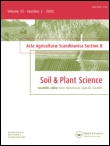
ACTA AGRICULTURAE SCANDINAVICA SECTION B-SOIL AND PLANT SCIENCE
Nurturing Innovation in Soil and Plant Research for Global ImpactACTA AGRICULTURAE SCANDINAVICA SECTION B-SOIL AND PLANT SCIENCE, published by Taylor & Francis AS, is a distinguished journal dedicated to the fields of Agronomy, Crop Science, and Soil Science. With an impressive impact factor, and categorized in Q2 for both Agronomy and Crop Science and Soil Science as of 2023, this journal is an essential resource for researchers, professionals, and students aiming to advance their understanding of soil-plant interactions and sustainable agricultural practices. Operating since 1992 and continuing through to 2024, ACTA aims to publish high-quality, peer-reviewed research that encourages the applicability of advanced scientific knowledge in real-world agricultural settings. While the journal is not open access, it remains widely accessible through institutional subscriptions, reflecting its commitment to disseminating essential findings and fostering innovation in soil and plant science worldwide. Nestled in the vibrant academic environment of Norway, ACTA AGRICULTURAE SCANDINAVICA serves as a key platform for nurturing groundbreaking research that informs sustainable agricultural policies and practices globally.

Pesquisa Agropecuaria Tropical
Empowering innovation in agronomy and crop science.pesquisa Agropecuaria Tropical is a premier Open Access journal dedicated to advancing the knowledge and practices within the field of agronomy and crop science. Since its inception in 1971, this peer-reviewed journal, published by the Universidade Federal de Goiás, has played a pivotal role in disseminating high-quality research from Brazil and beyond. Operating under an Open Access model, it ensures that scholarly articles are freely accessible, thereby fostering greater collaboration and innovation. With a Scopus ranking placing it in the 32nd percentile among its peers in agricultural and biological sciences, and a current classification in the Q3 category of agronomy and crop science, the journal serves as an essential resource for researchers, professionals, and students alike. As it continues its publication journey from 2010 to 2024, it remains committed to contributing valuable insights and advancements in the agricultural sector, ultimately influencing sustainable practices and food security.

Scientific Papers-Series B-Horticulture
Transforming Horticultural Research into Global Impact.Scientific Papers-Series B-Horticulture is a distinguished open-access journal published by the University of Agronomic Sciences and Veterinary Medicine Bucharest. With its ISSN 2285-5653 and E-ISSN 2286-1580, this journal has been accessible to the global research community since 2002, ensuring that vital horticultural research reaches a wide audience without barriers. Positioned at the forefront of the horticultural sciences, the journal serves as a platform for original research, reviews, and innovations pertaining to horticultural practices, plant physiology, and sustainable agriculture. Its contributions are not just significant in Romania but also resonate through the international scientific community, helping to address pressing agricultural challenges. The office located at 59 Marasti Boulevard, District 1, Bucharest 011464, Romania, symbolizes its commitment to advancing horticultural knowledge and fostering collaboration among researchers, professionals, and students alike. With no current H-index data, the journal invites continued contributions to enhance its visibility and impact in the field.
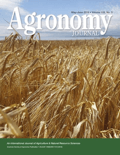
AGRONOMY JOURNAL
Empowering Crop Science with Decades of InsightThe Agronomy Journal, published by Wiley, is a leading platform for cutting-edge research in the field of agronomy and crop science. Established in the United States, this prestigious journal carries the ISSN 0002-1962 and E-ISSN 1435-0645, with its coverage spanning from 1976 to 2024, showcasing a wealth of knowledge over decades. The journal is recognized in the top quartile (Q1) of its category, making it a highly respected source for quality literature, ranking #108 out of 406 in the Scopus database and reflecting a 73rd percentile standing in agricultural and biological sciences. While it operates under traditional access options, its commitment to disseminating valuable scientific inquiry aligns with the objectives of advancing sustainable agricultural practices globally. The Agronomy Journal serves as an indispensable resource for researchers, professionals, and students eager to stay abreast of significant advancements and discussions influencing the future of crop science and agronomic research.

Zemdirbyste-Agriculture
Bridging research and practice in the heart of Lithuania.Zemdirbyste-Agriculture is a prominent journal dedicated to advancing the field of agricultural sciences, with a particular focus on agronomy and crop science. Published by the Lithuanian Research Centre Agriculture & Forestry, this open access journal has been fostering knowledge sharing and scientific discourse since 2004, allowing researchers, professionals, and students unrestricted access to its content. Located in the beautiful country of Lithuania, specifically at Vytautas Magnus University, this journal plays a significant role in disseminating innovative research findings. With a 2023 Scopus ranking of #246 out of 406 in the category of Agricultural and Biological Sciences, Zemdirbyste-Agriculture falls within the Q3 quartile, reflecting its growing influence in the academic community. This journal, which has converged its publication focus from 2008 to 2023, aims to provide a platform for scientists to share their critical insights on agricultural practices, sustainability, and technological advancements in crop science, thereby contributing to the global discourse on food security and environmental health.
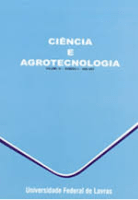
CIENCIA E AGROTECNOLOGIA
Driving Excellence in Agricultural Research and TechnologyCIENCIA E AGROTECNOLOGIA, published by UNIV FEDERAL LAVRAS-UFLA, is a vital open-access journal since 2005 that serves as an influential platform for disseminating research in the fields of Agronomy, Animal Science, Food Science, Soil Science, and Veterinary Science. With its ISSN 1413-7054 and E-ISSN 1981-1829, this journal is recognized for its contribution to science and technology advancements in agriculture, particularly in Brazil, fostering knowledge exchange among researchers, professionals, and students. Currently ranked in the Q2 quartile for Agronomy and Crop Science, Animal Science and Zoology, and in the Q3 quartile for Food Science and Soil Science, it demonstrates a solid international standing in the relevant Scopus indices. The journal's commitment to open access ensures that critical research findings are freely available, enabling a broader impact and encouraging collaborative advancements in agritech. As the journal looks towards its converged years from 2007 to 2024, it continues to uphold its objectives of promoting sustainable practices and innovation within the agricultural sciences.